Friday Night Unplugged #15: Agricola
- Updated: 8th Mar, 2013
Welcome back to Friday Night Unplugged. Last week we finished up the second half our Eclipse piece and we’ve had some great feedback from it. We’re already working on our next 2-part piece but don’t panic, it won’t be for a while yet.
This week we’re looking at one of the most highly regarded boardgames in the industry. Currently sitting at third in BoardGameGeek’s board game rank chart, Agricola is another game from Pandemic publishers Z-Man Games. Instead of battling disease and death players take on the more relaxed but still brain-meltingly complex task of guiding their families through six harvest seasons while building up their farm and improving their buildings, all in the name of scoring points. Agricola is also mentally complex, so this explanation will be a little longer than others.
What is it:
Agricola is a resource management/strategy/what-am-I-doing? game where players start with 2 family members and a small home on a homestead. Players start with access to a small number of actions which they can take by placing one of their family members from the homestead onto the action. Only one person can take each action per round and can only take as many actions as they have family members. Here’s a list of just a few of them.
- Adding grain to your resources.
- Building extensions, stables and fences on your homestead by spending materials.
- Ploughing or sowing fields.
- Taking wood, clay, stone or reed materials from an action space.
- Claiming the starting player token and drawing an improvement card for your hand.
- Growing your family provided you have built an extension.
- Taking cattle, sheep and boar from action spaces.
- Taking food by claiming fishing or day labour spaces.
Out of that list, only a small number start on the board. Each round adds new action cards, allowing players different or more advanced actions and resources are added to the relevant production card. For example, building extensions for your houses is available right from the start of the game but upgrading their materials to higher -scoring materials such as clay or stone isn’t available until later.
Splitting up the game’s 14 rounds are six Harvests. During each harvest every player may take one grain from each of any sown fields they may have. They then have to pay two food tokens per family member. Animals can only be converted into food once you’ve played certain improvement cards, which you might not even see. Grain can be converted into one food per grain unless you have an oven to convert it into four or five food per grain.
Surviving each harvest gets increasingly difficult with fewer and fewer rounds between harvests meaning players really do need to think ahead. Can’t afford to feed your family and you’ll gain one begging card per food you can’t afford. These dock you points at the end of the game.
To top it all off the scoring system is relentlessly unforgiving. Let’s have a quick look at the ways you can lose points.
- Players lose points for unused spaces on their homestead.
- Basic wooden houses don’t earn points.
- Not having any animals in a type loses you points.
- Begging cards lose you points.
Scoring points is based on how many animals, rooms and family members you have, plus bonuses from improvement cards. Simple right? Lets see how it plays.
Let’s Play
Agricola is a dense game and it’d just take too long even to do a shortened playthrough. Instead I’ll be visiting one section in the late stages of the game. I’m joined as usual by Fi and Josh for this playthrough.
We’re just coming into round 8 after the second harvest of the playthrough. None of us have anything substantial. Fi’s homestead has two fields sown with grain and not much else. She’s spent the last two harvests focusing on stockpiling food from day labour and fishing. Josh has a sown grain field and two pastures with stables, currently holding sheep. I previously built an expansion and ploughed one field. None of us have any food remaining and we have a few basic materials each.
Round 7
Josh is the starting player of this round and he claims the plough field action, gaining him a field on his homestead. Fi takes some reed from an action space and adds it to her stockpile. I claim 3 food that has slowly been building up from a fishing stockpile.
Josh decides he’ll finish this round by drawing a Major Improvement card. Fi spends the reed she previously gained to pay for a Basket Improvement card from her hand, meaning she takes less wood from a space but gains 3x food every time she does. She then takes 2 wood. I play an outhouse card from my hand to add to my points at the end of the game then follow up by taking a family growth action. I place one of my spare family discs on the same space as the action to mark that.
In between rounds we return all family members to our hand and place new materials on the board where required. Rather than explain each resource we added to it, here’s a picture of the current action board setup.
Round 8
Because everybody has been pre-occupied with actually developing their land, nobody has taken the starting player token from Josh yet so he goes first and straight away claims a fishing action for some food. Fi takes the two wild boar from the board and places them in her homestead. She doesn’t have a stable so they take up 1 space each. Not highly efficient compared to stables but good enough for the early game stages we’re in. I take the chance to grab the day labour action and get to add two food to my pile. Josh takes one of two woodpiles with Fi quickly swooping in for the other. Thanks to timing and my family growth action last turn I still have two family members left to spend on actions, I take a grain action and add it to my pool and follow up by spending three clay and three reed to upgrade my wooden huts to clay.
Harvest
Harvest time. First Fi and Josh take one grain each from their sown fields and add it to their stockpile.
Feeding: Fi converts her grain into food and easily pays the two each for her family members. Josh has a little more difficulty – he only has one food plus one grain. He converts his grain into food but is still short by two. Because of this he has to take two begging cards giving him -3 points per card at the end of the game. I convert two grain into food and gain one extra food from a butter churner I purchased earlier in the game. Because I have three family members now I have to pay six food but I just manage it this time.
What we think.
I’ll get this out of the way first. Agricola is a complex beast of the game, tactically. Even Eclipse is like a simple game of Tsuro in comparison. The problem isn’t in its complexity though. The problem is with its rulebook. While not as tomelike as the Arkham Horror rulebook, it is filled to the brim with pages and pages of tiny text. Every rule and interaction is written down in such a way that reading it feels more like deciphering a foreign language than learning a game.
For example, what the rulebook explains about point scoring in almost a full page is summed up in a tiny chart in the corner and on the back of cards handed to players. It is without a doubt the worst rulebook I’ve ever seen and it’s a serious downer on the first few games.
The other issue is that everything Agricola does right is also a downside. Missing out on the early resources can seriously set you back in the game, not planting your fields early enough hampers you and every choice you make has a repercussion. Use a family member to draw a card or claim the starting player token and you lose one action that could have been spent on food. If you’re not the type of person who can easily plan 2-3 rounds ahead of your play then Agricola really isn’t for you. Josh has issues with it for that very reason. Fi, on the other hand, likes Agricola but like me, believes it doesn’t quite live up to its hype.
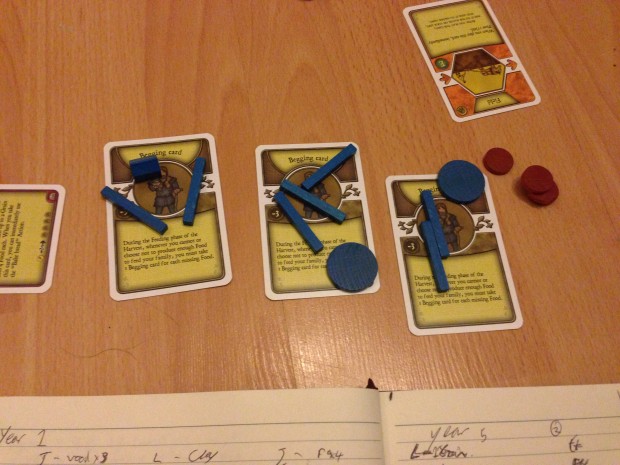
We had to use player pieces to represent the number of begging cards Josh had to claim in the end. They added up quickly.
Once you get past all that Agricola is a good game. It’s easy to see why it’s rated so highly, although I don’t agree with it being quite as highly rated as on BGG. You see, it is great. The family management is perfectly executed, growth means you need an expansion on your house which means you need reeds and wood and enough food income to be sure you can afford the extra mouth to feed in the long run. Especially as the rounds between harvests get shorter.
Everything needs to be planned out down to the last resource at least 2-3 turns before hand and the depth of choices is astounding. Agricola does the perfect job of emulating the life of 17th century farmers so long as you ignore the fact it takes one round for a baby to grow into an adult capable of working the fields.
The Basics:
Agricola is a resource management and family planning exercise based in the 17th century. It’s for 1-6 players and takes roughly 30 minutes per person according to the box. That sounds pretty accurate.
There are a ton of pieces. Each material has a token, each fence, stable and player, every type of tile even the animals have specially shaped animeeples. There are 3 types of main cards split into 3 different subtypes of decks depending on the complexity of the game. There are so many pieces to organise that the first game you play from the box is more like an endurance test.
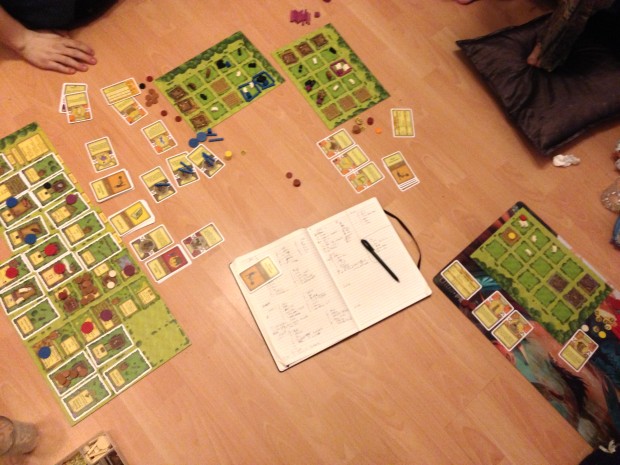
For an idea of scale here’s the setup at the end of the game for a 3 player game. Featuring a cameo from Josh’s hand Fi’s winning board at 19 points (top right) is covered in stuff. My board finished at 19 points and Josh at -27 thanks to a pile of begging cards.
Conclusion:
Don’t get me wrong Agricola is a game I have a lot of respect for, it’s one of the few ‘euro’ style resource management games I’ve actually enjoyed and I’d take it over Catan any day. Out there, I imagine, are a group of people seething at the idea of me saying it isn’t the best thing ever. I also imagine there are a few who agree it certainly has its flaws. Basically what it comes down to is if you like Catan and its economic strategies then Agricola is definitely for you. If not see if you know someone who has a copy, it’s definitely worth a try. Head over to Amazon where you can pick it up for £47.
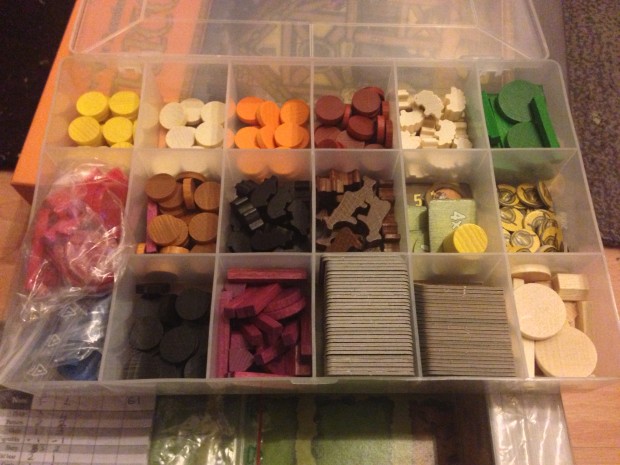
For lord’s sake get some sort of box to organise the tokens like we did. You’ll thank me for it later.
Next Week:
It’s time to leave the 17th century behind and go back to a galaxy far far away. We’re checking out the tabletop space battle miniatures game X-wing: Star Wars Miniatures Game from Fantasy Flight. Get practising your laser sounds, this is going to be fun.

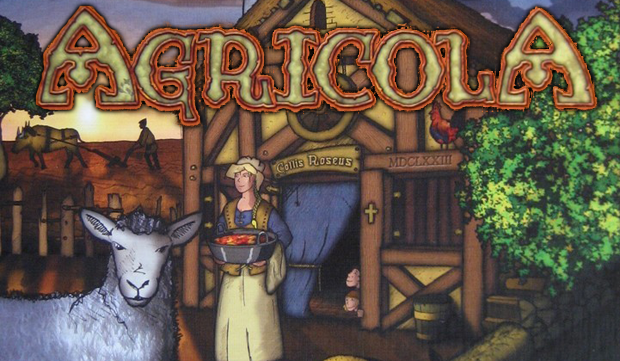
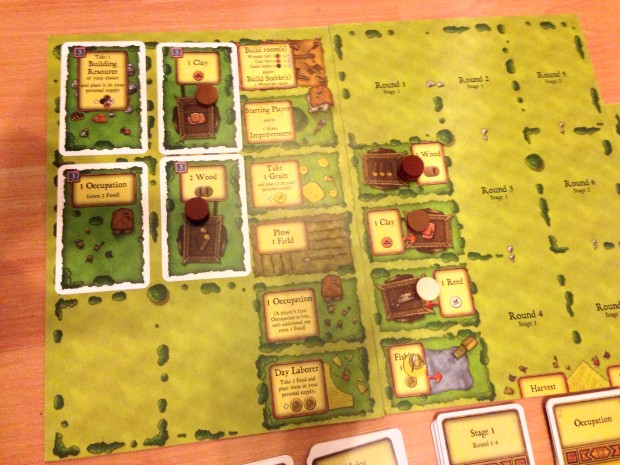
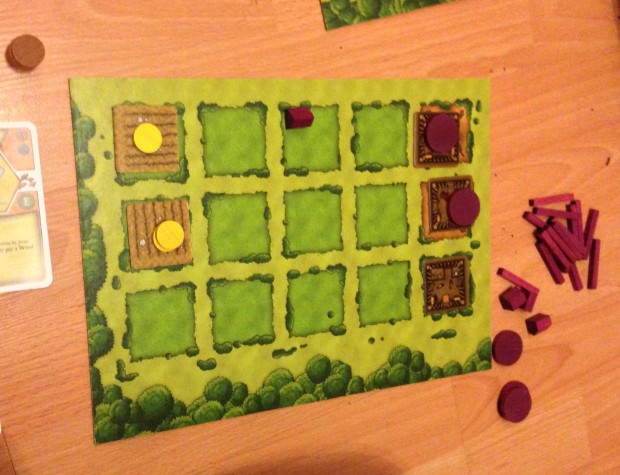
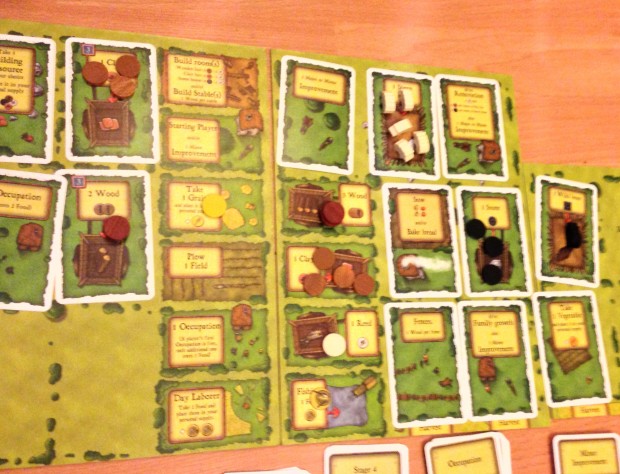
Follow Us!